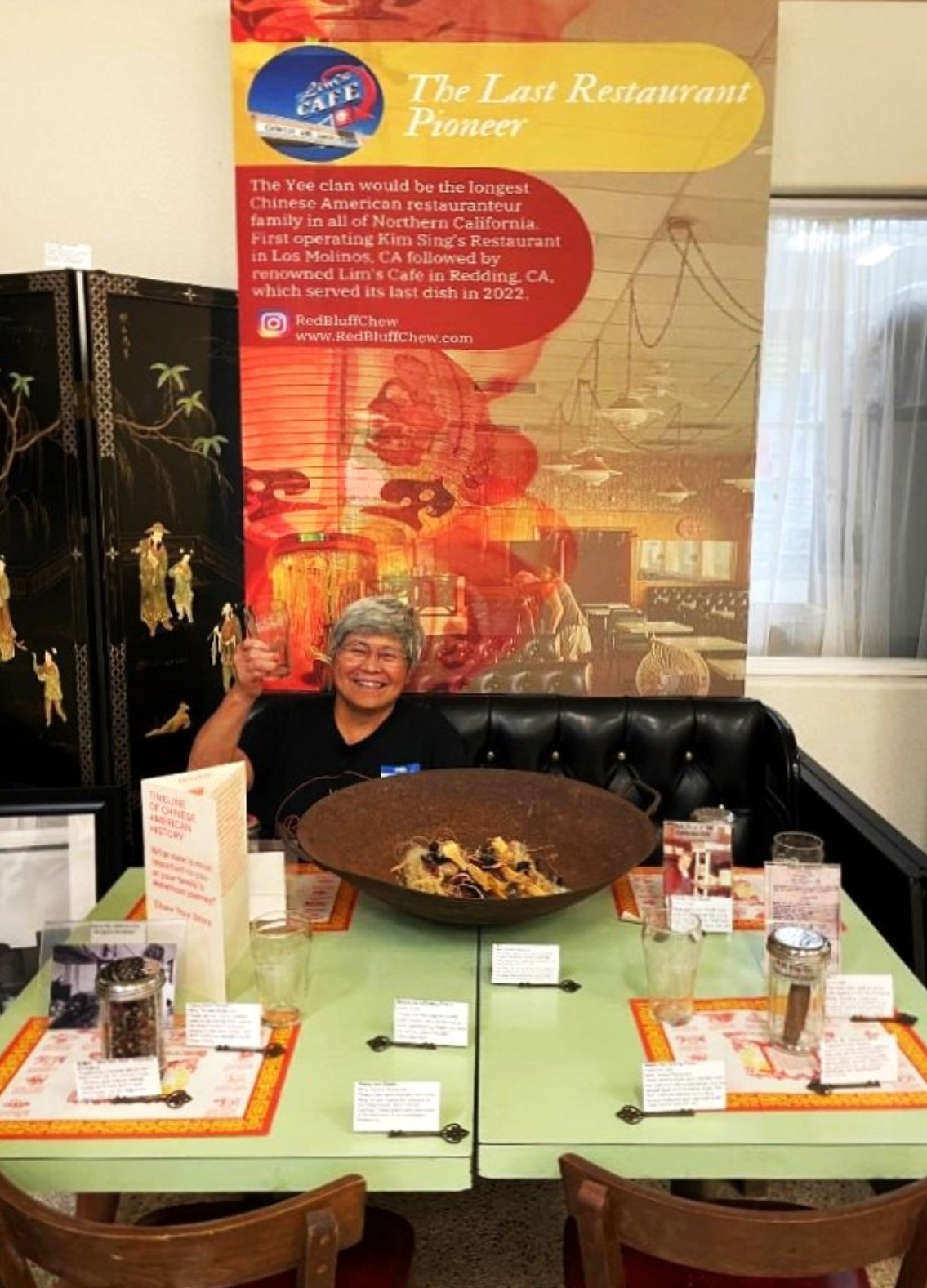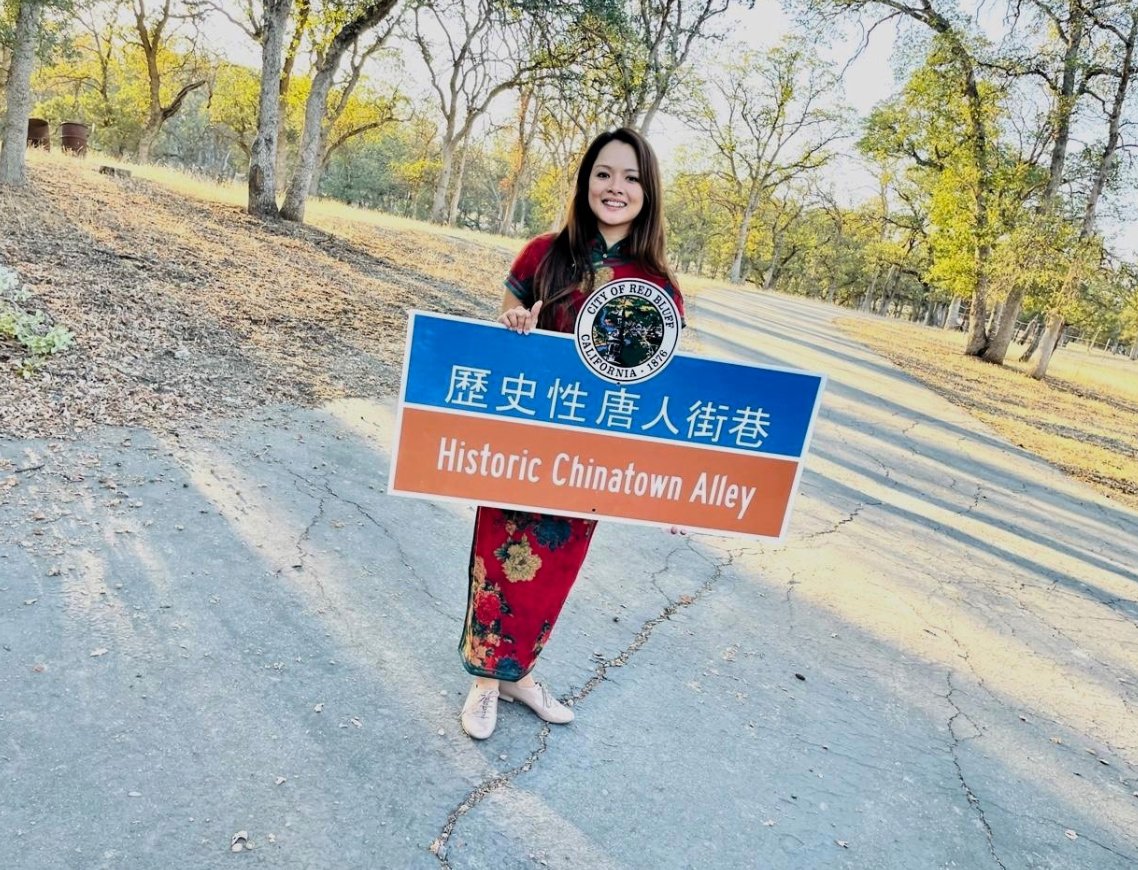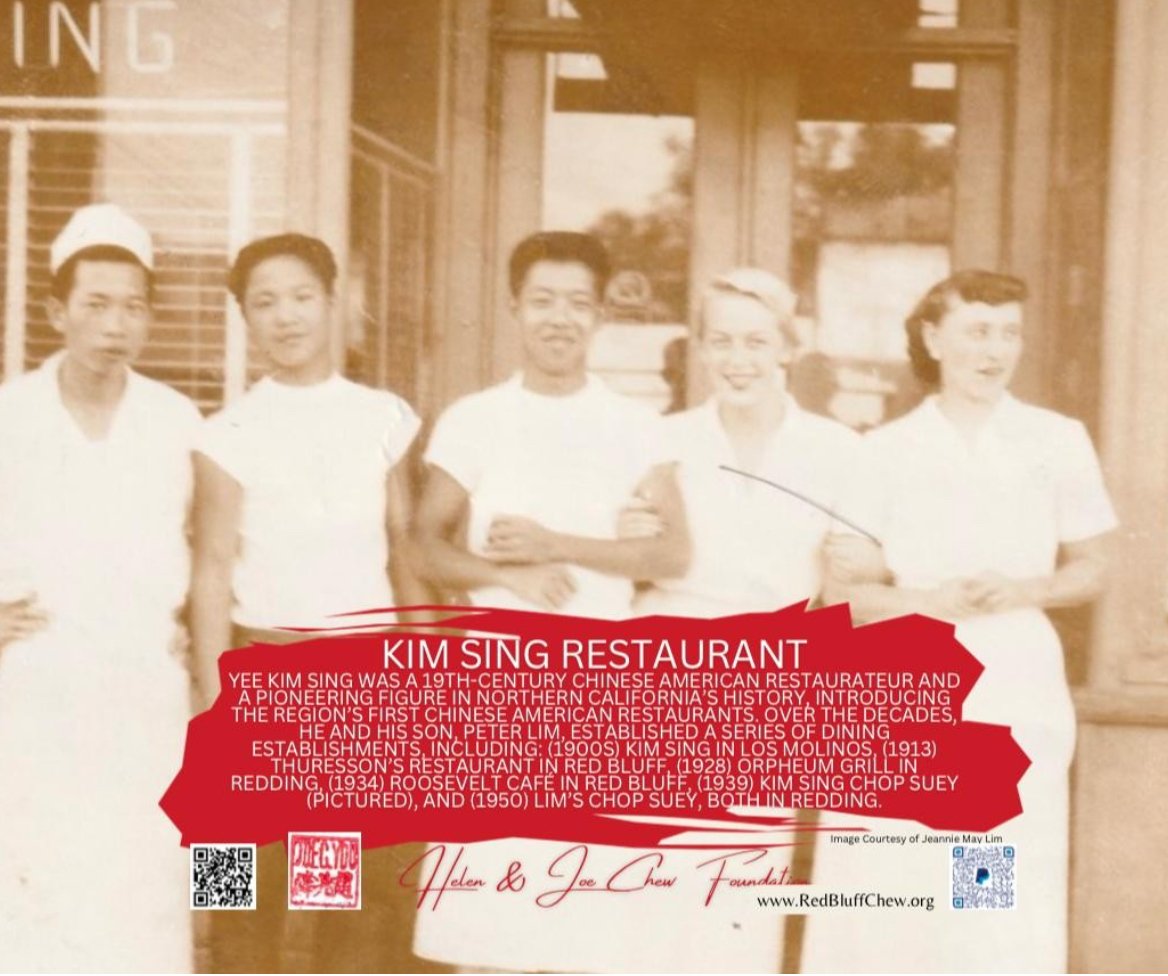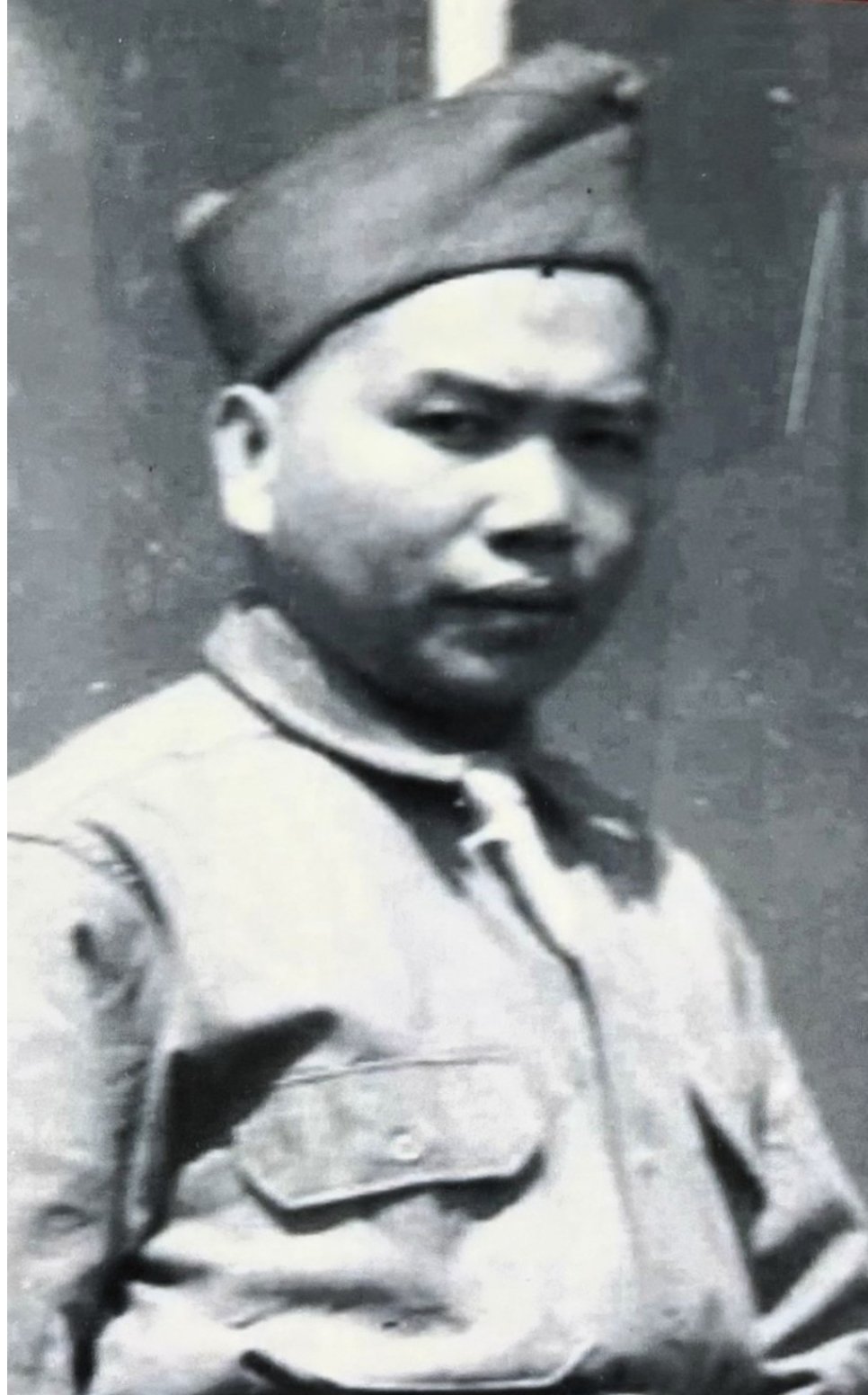Exhibit at Redding Library Traces Family Legacy of Lim’s Cafe
The new owners of the Lim’s Cafe building plan to keep the weatherworn sign atop the North Market Street building. Liyi Li and Haishan Chen will have their own sign for their as-yet-unnamed restaurant, which could open late in 2025. (Photo by Mike Chapman for A News Cafe)
Posted on February 16, 2025 by Mike Chapman
Although the now-shuttered Lim’s Cafe is just a memory, its legacy is not forgotten.
A new exhibit at the Redding Library tells the backstory of the beloved Chinese-American restaurant that closed in 2022 after members of the Lim family served generations of customers for nearly 90 years.
Restaurant founder Peter Lim also is featured in an accompanying tribute to Chinese-American veterans who fought for the United States in World War II.
During the war years, Lim took a break from the restaurant business to serve as a U.S. Army scout in Europe, earning a Purple Heart and a posthumous Congressional Gold Medal.
The second-floor exhibit, presented by the Helen and Joe Chew Foundation of Red Bluff, lets former cafe customers reminisce and introduces a piece of Redding history to a fresh audience.
The exhibit also honors the retirement of the Lim sisters – Jeannie, Bonnie and Pat – who ran the restaurant for some 46 years after their parents, Peter and May, retired in 1976.
Bonnie Lim, daughter of Peter and May Lim, sits at an original booth from Lim’s Cafe that’s part of a restaurant retrospective on the second floor of the Redding Library. The exhibit runs through August. (Photo courtesy of Jessica Chew of the Helen and Joe Chew Foundation of Red Bluff)
Family succession
Jeannie Lim was in Sacramento and sister Bonnie was in San Jose at the time in the mid-’70s.
“My mom and my dad called us. They said if you guys don’t want to come home and run it, we’re going to sell it,” said Jeannie Lim of Redding.
So they returned to Redding and got a crash course in the kitchen. Jeannie said she really wanted to cook.
“My mom said, ‘You don’t want to cook.’ And I said, ‘Yeah, I really want to cook.’ And so I begged her to teach me. She said, ‘You’ll be sorry.’”
Lim’s son, Ron, worked at the cafe during high school, Jeannie Lim said, but went on to become a pharmacist in Redding.
“This is a special story near and dear to me. … The same family served Chinese-American food until 2022, becoming more than just a restaurant. It taught us Chinese-American food as we know it today,” said close acquaintance Jessica Chew of Red Bluff.
Chew heads the family foundation as the only grandchild of Red Bluff pioneers Helen and Joe Chew. She created the library exhibit with the help from Jeannie Lim, 73.
The Lim’s Cafe exhibit inside the Redding Library includes a tribute to Chinese-American veterans from Tehama County who served for the U.S. during World War II, including Lim’s Cafe owner Peter Lim, at left. The mural was created by Candy Kuo. (Photo by Mike Chapman for A News Cafe)
The two women’s involvement in the project arose from longtime family connections. Jessica’s grandfather, Joe, was acquainted with Jeannie’s grandfather, Kim Sing. The two men go way back in Red Bluff where Sing welcomed the arrival of his adopted son, Peter, from China at the age of 14. And so, Peter grew up with Chew family.
Many Chinese people immigrated to California by ship during the Gold Rush era with some families later settling in Red Bluff, the steamboat’s northernmost stop on the Sacramento River, according to Chew.
Jessica Chew of the Helen and Joe Chew Foundation has spearheaded a historical exhibit of Lim’s Cafe at the Redding Library with help from Peter Lim’s daughter, Jeannie Lim. (Photo courtesy of Jessica Chew)
Jessica Chew’s family roots date back to 1865 when her predecessors arrived in Red Bluff to open an herbal shop to practice Chinese medicine.
Meanwhile, Sing started a string of Tehama County restaurants with Peter Lim’s help. Sing later sold one of them, the Roosevelt Cafe, to Joe Chew in 1948, his daughter said.
That restaurant later became the Chew family’s restaurant, the Ming Terrace, which lasted until the 1970s. The business sold to became the Peking Restaurant, and then later turned into the Guadalajara Restaurant that’s on Main Street today.
“But actually, we didn’t make Chinese-American food. That’s something that had to be taught to us by the Lim family,” Chew said. “Peter Lim stayed in touch with my family all the way up into his death.”
Chew had gone to Lim’s Cafe a year or two before it shut down in 2022 to meet up with Jeannie.
“Before Lim’s closed, Jeannie and I had talked what was going to be the legacy afterward and I worked with Jeannie to get one of the booths from the restaurant and a couple of tables,” Chew said.
A photo from the Lim’s Cafe library exhibit shows the restaurant in its heyday. (Photo courtesy of Jeannie Lim and the Jessica Chew of the Helen and Joe Chew Foundation of Red Bluff)
Her dive into their families’ past led to the exhibit.
“I think Jessica did a great job,” Lim said. “Jessica did all this research because I didn’t even know the story about their family and our family. But I know we went to Red Bluff every Sunday to visit them.”
Journey to U.S.
Peter Lim’s immigration documents show he came to America as a teenager as the adopted son of Kim Sing, Chew said. The federal Chinese Immigration Act of 1882 restricted the arrival of people of Chinese ancestry, she said, so Lim became his “paper name.”
The Lim’s family surname was Yee, but Peter had to immigrate under the surname Lim during an era when Chinese-Americans faced barriers and discrimination, Chew said.
“They bought papers to come. So actually (Peter) was illegal,” Jeannie Lim said. “Growing up, they always called me ‘paper girl’ and I didn’t understand.”
The exclusion act limited immigration and denied citizenship, Chew explained.
Sing, Lim’s “paper father,” went on to establish a string of Chinese-American restaurants in Los Molinos, Tehama, Red Bluff and Redding, Chew said. As the story goes, Sing actually bought and paid for Lim – a common practice in those days – so he could get to America.
“Peter’s role in the Kim Sing family would be to help Kim Sing expand his restaurant business. So Kim Sing and Peter would then go on and open multiple restaurants in Redding after they opened several restaurants in Red Bluff,” Chew said.
Chew said her family was grateful because Sing sold them one of his restaurants when Red Bluff’s Chinatown was demolished to make way for riverfront homes in 1948.
‘Lot of history’
Lim’s Cafe traces its lineage to the Kim Sing restaurant that opened in 1933 on Tehama Street in downtown Redding. Sing’s son, Willie, was part of the crew.
“From Kim Sing’s, my uncle and my dad split off and opened their own restaurants. My uncle’s was the Far East,” Lim said. “There’s a lot of history.”
Employees pose in front of the Kim Sing Chop Suey restaurant in Redding in this undated photo. Peter Lim is not pictured but Kim Sing’s biological son, Willie, is shown at the far left. (Photo courtesy of Jeannie Lim and the Jessica Chew of the Helen and Joe Chew Foundation of Red Bluff)
So, Peter Lim opened Lim’s Chop Suey on Yuba Street before he moved to the Miracle Mile location in 1957 and changed the name to Lim’s Cafe, the daughter said.
“If you think about it in reflection, the Lim family really created generations of Chinese-American food that influenced our communities and how we enjoy Chinese-American food today,” Chew said.
For those who want more history, Chew plans to hold a fireside chat at the library in September.
“I will focus on the origin story of the Lim family dating to 1900s in Los Molinos, California,” she said.
Telling the pioneering history of Chinese-Americans in the North State is one of the goals of the Helen and Joe Chew Foundation. Chew and the foundation also sponsors cultural events such as the Chinese Lunar New Year celebration.
Military honors
Part of the library exhibition is a tribute to Chinese-American veterans, including Lim, in the form of a mural created by Taiwanese-American artist and muralist Candy Kuo of Austin, Texas.
Peter Lim served in the U.S. Army during World War II, earning a Purple Heart and posthumously, the Congressional Gold Medal. He was drafted into the Army at age 36, daughter Jeannie Lim said. (Photo courtesy of Jeannie Lim and Jessica Chew of the Helen and Joe Chew Foundation of Red Bluff)
One of Lim’s medals is the Purple Heart.
“He said (the injury) was just a piece of shrapnel,” Lim said.
Kuo’s artwork resembles the World War II Congressional Gold Medal produced by the U.S. Mint, but with depictions of the Tehama County heroes.
Lim was able to gain his U.S. citizenship when the 1882 Chinese Exclusion Act was repealed in the wake of World War II.
He brought his wife, May, and older daughter Pat to America owing to the War Brides Act. Bonnie and Jeannie were born at Redding Memorial Hospital, now known as Shasta Regional Medical Center.
“We had 13 Congressional Gold Medal recipients in Tehama County for Chinese-American veterans. However, by the time they received that recognition, it was 2021, and they had all been deceased,” Chew said.
She explained Peter Lim was honored because his origin story is from Tehama County.
“Tragically, none of our Tehama County’s recipients lived to see this honor,” according to Chew, including Lim who died in 1993. His wife, May, passed away in 1990.
Lim rejected prejudice
As a person of Chinese descent, Peter Lim would’ve been known as a “celestial” during World War II. The derogatory term comes from a reference to China as the Celestial Empire.
Discrimination against Chinese immigrants, Chinese-Americans and Native Americans was prevalent when Lim operated his restaurants.
Nonetheless, Lim welcomed everyone to his eateries, especially Native Americans, Jeannie Lim said.
“Back in the day, they used to have signs in the restaurants, ‘No dogs and no Indians,’” she said. “But they said my dad would always let them in. And they remembered that and they passed it down.”
Lim said she personally recalls hearing one ethnic slur yelled at her in Redding as a child.
“These kids drove by and I was outside playing. They said, ‘Ching-Chong Chinaman’ and I kind of just looked, like what?” she said.
New life for old building
The doors to the former Lim’s could be swinging open again now that the building has been purchased by the owners of an already existing restaurant.
Liyi Li and Haishan Chen, the couple who own and operate Oriental Express Chinese Food in Shasta Lake, bought the cafe building last fall.
Li and Chen recently moved Oriental Express from their old location next to the ARCO station at the corner of Shasta Dam and Cascade boulevards to the former Mexican restaurant, Tinos, a few blocks away.
Li said they’re considering a Korean barbecue and Asian hot-pot style restaurant for the former Lim’s. Customers would be able to sit and cook their food in a shared pot containing simmering broth in the center of a table.
“We are working on it,” Li said. “We’re trying to get the tables. We don’t know where to get them now, so it’s going to be a challenge.”
A booth from the Lim’s Cafe display lets visitors sit and take pictures of themselves but also includes six containers holding traditional Chinese medicine herbs that people can smell, including cinnamon. (Photo by Mike Chapman for A News Cafe)
Another idea she said is to serve sushi.
If everything comes together, Li said their still unnamed restaurant could possibly open late this year.
“That’s the plan, but we still have to figure out a lot of stuff,” she said.
One thing that’s already been decided is to keep the now weathered Lim’s Cafe sign atop the building on North Market. The iconic neon sign served as a beacon to travelers on what used to be busy Highway 99.
“Yeah, just leave it,” Li said. “It’s nice.”
Preserving the sign is welcome news for Lim.
“I think it kind of has to stay,” she said. “Hopefully they’ll be able to restore it a little bit. It’s too much to take down.”
###
Lim’s Cafe Exhibit
Where: Second floor of the Redding Library, 1100 Parkview Ave.
When: Now through August 2025 (closed holidays)
Library hours: Monday through Thursday: 10 a.m. – 8 p.m.
Friday and Saturday: 10 a.m. – 6 p.m.
Sunday: 1 p.m. – 5 p.m.
YouTube video: https://www.youtube.com/watch?v=N_lSxdPScSo
For more, go to www.redbluffchew.org/chewhistory






